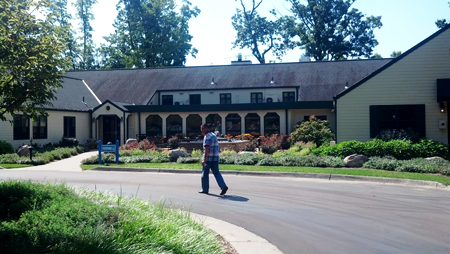| From Strugglingteens.com Visit Reports Holly, MI Rose Hill Center was an unexpected but delightful find at the end of my recent tour through Michigan and area. Their clientele are adults 18 and older with a diagnosis of a serious mental illness. In the private parent-choice network, there are very few that work with this population, but I'm convinced that Rose Hill should be on the list to check out for anyone working with an adult that fits this description. Their purpose is to take clients who have serious mental illnesses, and give them the treatment, training and support to enable them to eventually live as independently productive lives as their potential allows. In doing that, the Center has four tracks. First is their Residential Rehabilitation Program which aims at helping the residents achieve stability and restoring their self-esteem. This includes sophisticated treatment and medication management, along with personal growth through consistent structure and individual support, and working as part of a therapeutic work program such as farm animal care, housekeeping, kitchen or horticulture/grounds keeping. One goal of the work program is pre-vocational training. Once a resident is stabilized, they are engaged at least 20 hours a week through work on campus, working in local businesses, in school or doing volunteer work.
The length of stay depends on the needs of the resident. Although a very few might find Rose Hill perfect for their needs and would stay for years, most are there from six to twelve months. When a resident is stabilized and confident with good self-esteem there are two tracks. One is the Extended Residential Program for those who are ready for some independence but still needs on-going supervision. The other track is their Transitional Living Program which is as the name implies, preparing to transition back home or into the community with more normal independence. For those who will move to someplace within the surrounding community, there is the Community Support Program where they can attain independence, but can obtain support from the Center when needed. It was explained that their current population is mostly in their mid-20s, but adding in the older residents, the average age is 32. The Center is located on 412 acres, which borders a scenic lake. Many of the residences have marvelous views of the lakeshore from the lounge or their bedrooms. Most of the property is relatively undeveloped, with many walking trails along the lake and elsewhere, or is devoted to pastoral pursuits such as grazing animals. The first impression of the property when you first arrive is of a working farm, the visitor being greeted by a large red barn with all kinds of animals around for the residents to take care of and interact with. This is rather appropriate because I was informed the program was to a large extent inspired by Gould Farm, one of the early residential therapeutic communities in the nation. Having myself grown up on a farm in Idaho, during my tour of the barn everything looked and smelled like expected with horses in the arena or their stalls, and pigs in their stalls and chickens running around getting underfoot. The residents with work assignments in the barn consider this prime duty, completely enjoying every minute there they can. The visitor then passes by two huge greenhouses where they grow flowers for sale to the local community, and the attached garden where they grow food that will be used by the kitchen for Center community meals. Being late in the summer, the greenhouses had few plants left but was still decently organized. A little ways further on from the greenhouses is the Education Therapy Center, a very large new building. The Gym doubles as a lunch room with implements for volleyball and other activities, and numerous classrooms. In many ways this is the center of the formal program with classes, therapy sessions and many of the groups being held here. Down the slight hill toward the lake are the residences and administrative buildings. The staff I met were friendly, all the facilities were clean and well maintained, and the residents I saw and met seemed relaxed and feeling about as comfortable and emotionally safe as their illnesses allowed them to be. The weather being a mild comfortable late August of course contributed to the peaceful sense, but I could imagine during a rainy or snowy day, the atmosphere also could be described as cozy. I consider Rose Hill as filling a needed niche in the private parent-choice network. © Copyright 2012 by Woodbury Reports, Inc. |
